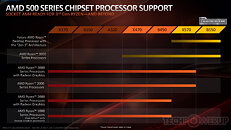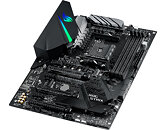Tuesday, May 19th 2020

AMD Backpedals, Zen 3 Support Coming to B450 and X470
AMD backpedaled on dropping support for its future "Zen 3" processors on AMD 400-series chipset motherboards. The company will work with its motherboard partners in integrating "Zen 3" processor support on certain beta versions of motherboard BIOSes. AMD also detailed how it plans to go about it. The said BIOS will be a one-way ticket to using "Zen 3" processors while losing support for all older microarchitectures.
The way it works is the motherboard manufacturer will integrate the Zen 3-only AGESA with a firmware that can squeeze into a 16 MB ROM. They may also choose to conserve ROM space in areas such as the UEFI setup program, which may not correspond with the motherboard's original feature-set. This is essentially similar to how MSI integrated "Zen 2" support on some of its older motherboards with 16 MB ROMs, by slimming down its UEFI setup program.Since the BIOS will chop support for all older processors, to prevent motherboard RMA chaos for manufacturers, they will set up a system that issues BIOS updates only to customers upon verifying that they actually own a "Zen 3" processor. The way we imagine this works would be similar to game bundles (retailer issues a BIOS update token along with the processor, or a scratch card next to the case badge inside the PIB). Flashing a 400-series chipset motherboard will be a delicate process. You will have to use the USB BIOS flashback feature (which luckily is well proliferated on the AM4 motherboard ecosystem). Alternatively, you should be able to begin the BIOS flashing process with an older processor installed, and immediately switch over to the newer Zen 3 processor once the flashing process is complete.
Also, the beta BIOS updates won't be immediately available, but rather when "Zen 3" processors are readily available in all the markets AMD serves. AMD reiterates, that "Zen 3" will be the final microarchitecture 400-series chipsets support, recommending that the processors will work best with a 500-series chipset motherboard for best performance and support for the latest features.
Controversy erupted when AMD revealed in its B550 chipset slide deck that 400-series (and older) chipsets won't support "Zen 3," which users felt betrayed AMD's promise of platform support running into 2020. In the absence of B550, many value-conscious buyers paired their brand new 3rd generation Ryzen processors with some of the more premium B450 chipset motherboards, in hopes of an upgrade path to "Zen 3."
The way it works is the motherboard manufacturer will integrate the Zen 3-only AGESA with a firmware that can squeeze into a 16 MB ROM. They may also choose to conserve ROM space in areas such as the UEFI setup program, which may not correspond with the motherboard's original feature-set. This is essentially similar to how MSI integrated "Zen 2" support on some of its older motherboards with 16 MB ROMs, by slimming down its UEFI setup program.Since the BIOS will chop support for all older processors, to prevent motherboard RMA chaos for manufacturers, they will set up a system that issues BIOS updates only to customers upon verifying that they actually own a "Zen 3" processor. The way we imagine this works would be similar to game bundles (retailer issues a BIOS update token along with the processor, or a scratch card next to the case badge inside the PIB). Flashing a 400-series chipset motherboard will be a delicate process. You will have to use the USB BIOS flashback feature (which luckily is well proliferated on the AM4 motherboard ecosystem). Alternatively, you should be able to begin the BIOS flashing process with an older processor installed, and immediately switch over to the newer Zen 3 processor once the flashing process is complete.
Also, the beta BIOS updates won't be immediately available, but rather when "Zen 3" processors are readily available in all the markets AMD serves. AMD reiterates, that "Zen 3" will be the final microarchitecture 400-series chipsets support, recommending that the processors will work best with a 500-series chipset motherboard for best performance and support for the latest features.
Controversy erupted when AMD revealed in its B550 chipset slide deck that 400-series (and older) chipsets won't support "Zen 3," which users felt betrayed AMD's promise of platform support running into 2020. In the absence of B550, many value-conscious buyers paired their brand new 3rd generation Ryzen processors with some of the more premium B450 chipset motherboards, in hopes of an upgrade path to "Zen 3."


93 Comments on AMD Backpedals, Zen 3 Support Coming to B450 and X470
At least they reversed their stance quickly. But not quick enough for people not to notice where their heart truly is ;)
This wasn't a simple yes/no question. AMD really had to give it a thought if it was feasible, and to what extent.
I even posted that in another thread last week:www.techpowerup.com/forums/threads/amd-b550-chipset-detailed-its-ready-for-zen-3-older-am4-motherboards-not-compatible.266710/post-4264677
My Mobo has Dual Bios (2 16mb chips), a lot of Mobos do. I Can have 2 complete different versions of bions on those 2.
Why not create an option to update the second bios to ZEN3 while using the #1 BIOS for ZEN/ZEN+/ZEN2?
and if you try to boot BIOS#1 with ZEN3 it detects and tryies the BIOS#2...
Is that not possible? too risky? legit question.
I recommened Gamers Nexus.
Normally it seems to be a matter you being able to flash the primary chip, but not the secondary one. I haven't had my secondary one kick in for so long that I don't even remember if gets flashed automagically or doesn't get updated at all.
I did exactly that on a Gigabyte P55A board.
I had a BIOS version that I modified on the main ROM and the original untouched BIOS on the backup ROM.
Mine required using a DOS flash utility and using the correct software switches to flash the back up BIOS.
It did NOT have a physical switch to do that.